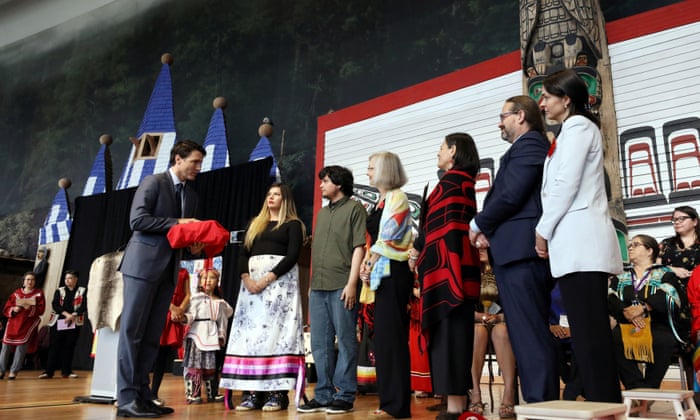Canada must not ignore Indigenous 'genocide', landmark report warns
- Up to 4,000 Indigenous women and girls killed or missing
- Justin Trudeau: ‘We have failed you. We will fail you no longer’
 Canada’s prime minister, Justin Trudeau, is presented with the final report into missing and murdered Indigenous women and girls in Gatineau, Quebec, on Monday. Photograph: Chris Wattie/Reuters
Canada’s prime minister, Justin Trudeau, is presented with the final report into missing and murdered Indigenous women and girls in Gatineau, Quebec, on Monday. Photograph: Chris Wattie/Reuters Leyland Cecco in Toronto-
Leyland Cecco in Toronto-Canadians can no longer turn a blind eye to the “genocide” of Indigenous peoples in the country, a landmark report on missing and murdered women has concluded.
Indigenous communities across the country have for decades attempted to convey the depth and scope of a tragedy that has haunted thousands of families.
As many as 4,000 Indigenous women and girls are believed to have been killed or gone missing in Canada over the past 30 years – although the true number of victims is unlikely ever to be known.
On Monday the findings of a three-year inquiry were released at a solemn ceremony in Quebec, attended by victims’ families, survivors, Indigenous leaders and senior government officials.
“This is an uncomfortable day for Canada,” said the prime minister, Justin Trudeau. “We have failed you. We will fail you no longer.”
The inquiry’s final report, a 1,200-page catalogue of historical and contemporary injustices, concludes that decades of policy and state indifference amounted to genocide against Indigenous peoples.
The report’s authors were blunt in their assessment: “If you’re not outraged, you’re not paying attention … This is every Canadian’s responsibility not to turn a blind eye.”
The report, called Reclaiming Power and Place, marks the government’s most signifiant attempt at determining the scope of the epidemic of violence that has claimed the lives of thousands of indigenous women.
“The violence against Indigenous women, girls, and 2SLGBTQQIA [two-spirit, lesbian, gay, bisexual, transgender, queer, questioning, intersex and asexual] people is a national tragedy of epic proportion,” wrote the chief commissioner, Marion Buller.
Commission members conceded that the term “genocide” is likely to provoke controversy in the country but said they carefully examined the United Nations definition of the term – as well as its original intent from the 1940s.
“Genocide is the sum of the social practices, assumptions, and actions detailed within this report,” they wrote.
Indigenous activists hailed the report as an important turning point.
“It’s powerful. It’s sad. It angers me. But it’s also hopeful because it shows the real strength, resilience and determination of Indigenous women and girls,” said Pam Palmater, a Mi’kmaq law professor at Ryerson University. “Our First Nations communities, our leaders and our activists just never gave up. They kept pushing and pushing.”
But others who attended the ceremony were disappointed by Trudeau’s failure to present new policies.
“The prime minister really offered up nothing more than words,” said Cindy Blackstock, a Gitxsan child welfare advocate and professor. “I was looking for something that would actually make a difference in the lives of women and girls today.”
Blackstock noted that the government’s recent budget that did not allocate any funding to implement the recommendations of the long-expected inquiry.
The inquiry – an electoral promise by Trudeau after the previous Conservative government refused to open one – accepted submissions from 2,380 people, including the testimony of 468 family members of survivors and victims across the country at 15 community hearings.
“Many Indigenous people have grown up normalized to violence, while Canadian society shows an appalling apathy to addressing the issue,” the commissioners wrote.
The report also includes 231 recommendations for future action.
“It must be understood that these recommendations, which we frame as ‘Calls for Justice,’ are legal imperatives – they are not optional,” said the report.
The wide-ranging recommendations include overhauling policing practices in Indigenous communities, giving Indigenous languages official status, creating a universal basic income and investing in early childhood programs for Indigenous youth.
While the document exposes a damning narrative of the country’s history, it also encourages a path forward.
“For many non-Indigenous people, it’s important to be ready to ‘unlearn’ some learned behaviours,” said the report.
Veldon Coburn, who teaches Indigenous studies at Carleton University, said Canadians need to understand the role of state institutions such as residential schools where more than 150,000 aboriginal children were taken in an attempt to forcibly assimilate them into Canadian society – and work to dismantle those practices.
But he added that Canadians also need to work to dismantle those practices.
“There shouldn’t be any settler Canadian who should feel personally responsible for this. They’ve never carried this out themselves,” he said. “It should be forward looking, in the true spirit of reconciliation with one another, saying we want to live in a community and respect the existence of our shared humanity.”
Before Canadian society begins to grapple with such difficult questions, Coburn said attention should be focused on the memories of the thousands of Indigenous peoples were murdered or have gone missing.
“The biggest point today is to honour those that are the most vulnerable within Canadian society, and who have borne the brunt of considerable discrimination and marginalization,” he said. “[Their] lives are worthy of equal concern and respect.”
